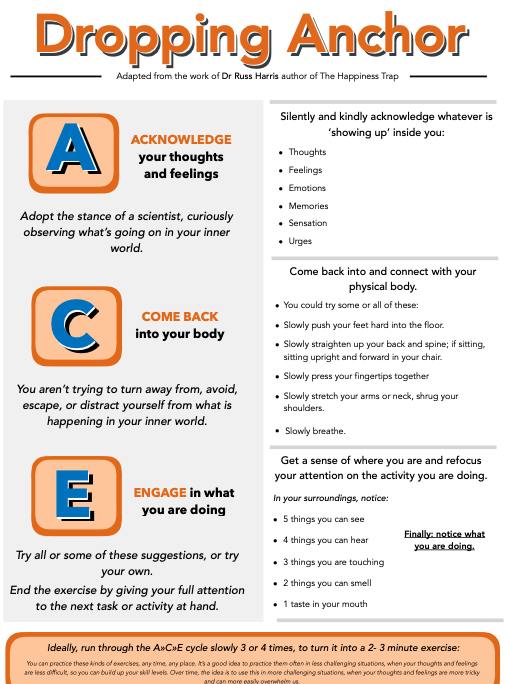How do I build self-compassion?
We can practice mindfulness skills, which help us to notice and acknowledge your current emotions and state of mind (Noticing), and to accept and normalise these experiences (Normalising).
When we notice and acknowledge suffering, there are find different ways to soothe yourself here. Sometimes, when you first start to practise self-compassion, you may experience an increase in difficult emotions. It is important to remember these are not created by the practice, but were likely already there, only now we are recognising them. When we practise self-compassion it can be helpful to remember to normalise the feelings that come up, and remind yourself that you are not on your own in these experiences.
However, if these feelings are overwhelming, you do not need to try and work ‘harder’ at soothing or fighting these feelings. You can take a step back and give yourself kindness in another way. On the other hand, if the emotions are difficult but workable, you may want to continue with the practice and explore these feelings, thoughts and emotions mindfully, or use a dropping anchor exercise to ground yourself in the present moment. (Please see image below)
It is natural for self-compassion practices to at times feel overwhelming. Germer (2009) has identified the backdraft, as he calls it, that we can sometimes experience when starting to practise self-compassion. The difficult emotions are not created by the practise but were already there and we are now able to recognise them. When you practise self-compassion meditations at home you will benefit from remembering that:
- It is normal that difficult feelings may arise. If they do, understand that you are suffering, that you are connected to a wider human experience, you are not on your own and be kind to yourself, as best you can.
- If these feelings are overwhelmingly strong, you do not need to try and intensify your loving-kindness to combat these feelings. You can always discontinue the practise and give yourself kindness in another way. This can also be an important consideration if you are feeling emotionally ‘numb’.
- If the emotions are difficult, but workable, and you want to continue the practise, then apply mindfulness to these feelings, thoughts and emotions. You can also use a dropping-anchor meditation to ground yourself in the present moment.

